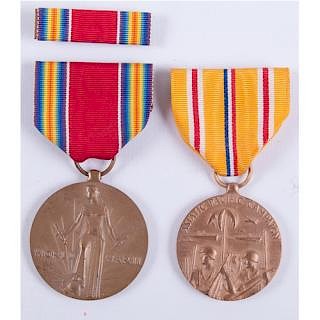Iranian Jezail Muzzle-Loading Rifle
About Seller
320 Pantops Center
Charlottesville, VA 22911
United States
Bremo Auctions is a full service auction house located in the historic town of Charlottesville VA. While our primary focus is on fresh-to-the-market property from distinguished Virginia Estates, institutions and private collections our individualized approach is tailored to meet the needs of each cl...Read more
Two ways to bid:
- Leave a max absentee bid and the platform will bid on your behalf up to your maximum bid during the live auction.
- Bid live during the auction and your bids will be submitted real-time to the auctioneer.
Bid Increments
| Price | Bid Increment |
|---|---|
| $0 | $5 |
| $50 | $10 |
| $200 | $20 |
| $500 | $50 |
| $1,000 | $100 |
| $2,000 | $250 |
| $5,000 | $500 |
| $10,000 | $1,000 |
| $50,000 | $5,000 |
About Auction
Dec 12, 2015 - Dec 13, 2015
Bremo Auctions info@bremoauctions.com
- Lot Description
Having full length of approximately 65", & stamped "Tower" to lock plate. Purchased in the mid-1960s by a U.S. Air Force Colonel in Iran. Some condition issues, please note photographs carefully. The jezail (sometimes "jezzail" from the Pashto language) was a simple, cost-efficient and often handmade muzzle-loading long arm commonly used in British India, Central Asia, & parts of the Middle East in the past. Jezails were generally handmade weapons, and consequently they widely varied in their construction. Jezails were seen as very personal weapons, and unlike the typical military weapons of the time which were very plain and utilitarian, jezails tended to be well crafted and were usually intricately decorated. Jezails tended to have very long barrels. These long weapons were never common in Europe (with the exception of the Spanish "espingarda" circa 15th century), and were otherwise seen in American rifles like the Kentucky Rifle. The American rifles were used for hunting, and tended to be of a smaller caliber (.35 to .45 or so being typical). Jezails were usually designed for warfare, and therefore tended to be of larger calibers than the American rifles, with .50 to .75 caliber and larger being common. Larger calibers were possible because the long length of the typical jezail meant that it was heavier than typical muskets of the time. Jezails typically weighed around 12 to 14 pounds, compared to 9 to 10 pounds for a typical musket. The heavy weight of the jezail allowed the rifle itself to absorb more energy from the round, imparting less recoil to the weapon's user. Many jezails were smooth bore weapons, but some had their barrels rifled. The rifling, combined with the barrel's long length, made these weapons very accurate for their time. The firing mechanism was typically either a matchlock or a flintlock. Since flintlock mechanisms were complex and difficult to manufacture, many jezails used the lock mechanism from captured or broken Brown Bess muskets. The stocks were handmade and ornately decorated, featuring a distinctive curve which is not seen in the stocks of other muskets. The function of this curve is debated; it may be purely decorative, or it may have allowed the jezail to be tucked under the arm and cradled tightly against the body, as opposed to being held to the shoulder like a typical musket or rifle. The argument against this method of firing is that the flash pan would be dangerously close to the face and the weapon would be harder to aim. It is more likely that the rifle was only tucked under the arm whilst riding a horse or a camel. The curve may also have saved weight; by shaving away some of the heavy wood used for the stock through employment of the new curved shape, whilst maintaining the same structural integrity of the stock it could still be fired from the shoulder safely whilst also being lighter. The weapon was fired by grasping the stock near the trigger, like a pistol, while the curved portion is tucked under the shooter's forearm, allowing the rifle to be fired with one hand while mounted. Jezails were often fired from a forked rest, or a horn or metal bi-pod.
- Shipping Info
-
Shipping is the responsibility of the purchaser. Some property that is sold at auction can be subject to laws governing export from the U.S., such as items that include material from some endangered species. Import restrictions from foreign countries are subject to these same governing laws. Granting of licensing for import or export of goods from local authorities is the sole responsibility of the buyer. Denial or delay of licensing will not constitute cancellation or delay in payment for the total purchase price of these lots.
Domestic and International Shipping Recommendations are as follows:
(1) Blue Ridge Pack & Ship: (434) 977-8462 or info@blueridgepack.com;
(2) Freighters & Craters: (804) 778-4455 or (877) 744-7496;
(3) Pack-n-Mail: (434) 971-5911 or packnmailva@gmail.com;
(4) Worth Moving: (804)571-6311, (804)898-8412, or worthmoving@gmail.com;
(5) UPS Store: (434) 975-1100 or store3344@theupsstore.com<
>(6) Winbtersteen Trucking (785) 543-5999 or (800) 253 - 0617.<
>It is highly recommended that you contact a shipper prior to bidding for larger items, as they have insight to shipping costs that may be instrumental in your bidding decisions. Thanks for your loyalty and patronage, & for participating in our auction.
-
- Buyer's Premium



 EUR
EUR CAD
CAD AUD
AUD GBP
GBP MXN
MXN HKD
HKD CNY
CNY MYR
MYR SEK
SEK SGD
SGD CHF
CHF THB
THB



















